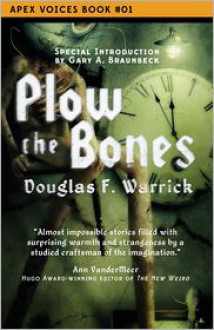
Intellectually surreal and emotionally disturbing, Douglas F. Warrick's collection of tales marks a superb introduction for readers to the Apex Voices line of fiction. Not having had any prior experience to Warrick or his work, I wasn't sure what to expect when the review request first came in, but Plow the Bones sounded like an intriguing collection - and, let's be honest, an introduction from Gary A. Braunbeck certainly didn't hurt.
What we have here is a collection that runs the literary gamut from snippets of narrative scenes to full-fledged story arcs, the diverse pieces held together by an imagination that refuses to accept any sort of mental, emotional, or physical boundaries. Comprised of equal parts WOW and WTF, Warrick's work is neither for the squeamish, nor for those readers secure within their four walls of the traditional narrative. While I wouldn't quite call the writing experimental, and am hesitant to use the tired old clichés of avant-garde, it is refreshingly original, challenging, engaging, and entertaining, all at the same time.
Behindeye: A History is one of those strange little snippets, a tale that can be read on many levels, which sets the stage for everything that follows. It's almost as if Warrick is confronting the reader with a bold demand to get inside his head, with the unspoken agreement being that he gets to climb inside ours as well.
As for what follows that invitation, highlights for me included:
Funeral Song for a Ventriloquist - a sad and melancholy story of a dead ventriloquist's sole surviving doll and the cautionary tale he weaves for a young girl. It seems so simple and direct, but has the kinds of layers to it that you might expect from a classic Twilight Zone episode.
Her Father's Collection - by far, my favourite of the collection. Here, Warrick tells us a tale of obsessive love, in which a father commits the ultimate atrocity, simply so that he never has to let go. Not content to stop there, he wraps that tale in a ghost story so cruel, and so chilling, that you almost want to applaud his audacity by the end.
Zen and the Art of Gordon Dratch’s Damnation - is probably the most intellectual of all the tales in the collection, a philosophical musing in which a dead young man is forced to suffer the Judeo-Christian idea of eternal damnation . . . and who comes out the other side, having denied the pleasures of heaven along the way, due to a rather Buddhist philosophy.
Ballad of a Hot Air Balloon-Headed Girl - a weirdly touching tale of innocent lost, the mindless suffering of war, and the magic inherit in freedom of it all. The battlefield story could have been a story in and of itself, but contrasting that grisly reality with the fantasy of a girl with a head that becomes its own hot air balloon really pulls it all together.
Stickhead - almost demands comparisons to Stephen King's The Body, with two kids discovering a decomposing corpse in a ditch, but goes in a very different direction. Rather than exploring how such a find might force onto to confront their own mortality, Warrick invites us to poke the body with a stick and see what happens.
I Inhale the City, the City Exhales Me - is a surreal story of life imitating art. It all begins with the concept of anime drawings comprising their own reality, which is exciting on its own, but when it begins exploring the idea that even those we trust to report on events around us are actually creating it as they go . . . well, it all gets rather disturbing.
Across the Dead Station Desert, Television Girl - a serious contender for my favourite entry, a darkly erotic tale of the ultimate in masturbatory innovation, and an invention that goes so very, very wrong. Beneath the surface, however, it's also a story of objectification, obsession, and possession, a condemnation of our need to compel our pleasures.
Plow the Bones is a relatively short collection, but by no means a quick read. These are stories to be savoured, considered, and sometimes even reread to uncover all of the layers. The language of the writing is well-suited to the surreal creepiness of the stories, drawing us in with the promise of poetry, but then ensnaring us in subtle arguments and criticisms. It's a weird, wild ride, and a welcome dose of originality.
Originally reviewed at Beauty in Ruins


 Log in with Facebook
Log in with Facebook 







